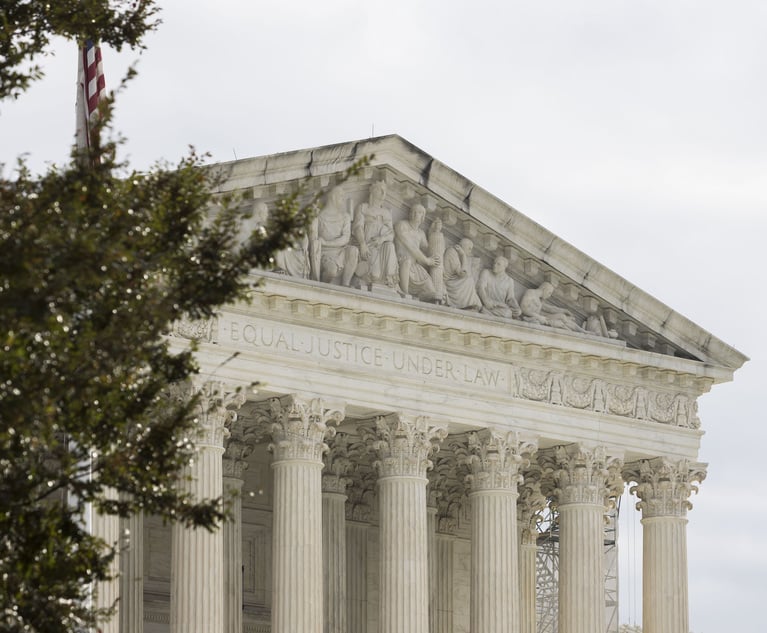 Slack app on an iPhone screen. Photo: Diego M. Radzinschi/ALM
Slack app on an iPhone screen. Photo: Diego M. Radzinschi/ALM High Court Confirms Strict 'Tracing' Requirement of Section 11 of the Securities Act
While the court's decision in Slack confirmed an important limitation on Section 11 litigation, it left the door open to a potential expansion of liability in connection with the Securities Act's registration requirements under Section 12(a)(2) in the future.
June 30, 2023 at 11:15 AM
12 minute read
The U.S. Supreme Court recently decided the most significant securities law case of court's current term, Slack Technologies v. Pirani, a case raising substantial questions about the scope of private litigation under the Securities Act of 1933. In the decision below, the U.S. Court of Appeals for the Ninth Circuit had held—contrary to 50 years of Securities Act case law, including the Ninth Circuit's own prior rulings—that investors could assert Securities Act claims based on an allegedly misleading registration statement without showing that they purchased shares registered under the challenged registration statement. A Supreme Court decision affirming the Ninth Circuit's novel ruling could have radically expanded the scope of potential Securities Act liability. In a short unanimous opinion, however, the Supreme Court reversed the Ninth Circuit and confirmed that Section 11 of the Securities Act requires plaintiffs to "trace" the shares they purchased to the challenged registration statement. But the court did not decide whether Section 11's sibling provision, Section 12(a)(2), imposed a similar tracing requirement, instead remanding for the Ninth Circuit to decide that question in the first instance. Thus, while the court's decision in Slack confirmed an important limitation on Section 11 litigation, it left the door open to a potential expansion of liability in connection with the Securities Act's registration requirements under Section 12(a)(2) in the future.
The Securities Act's Private Rights of Action and the 'Tracing' Requirement
The Securities Act regulates public offerings of securities. Among other things, it requires companies offering securities to the public to register those securities with the SEC. To register securities for sale to the public, a company must file a registration statement with the SEC, comprised of two parts: a selling document or "prospectus" with detailed information about the company's business, which sellers must supply to anyone to whom they seek to sell the securities and certain additional exhibits and information that the company must file with the SEC but need not be supplied to purchasers. The Securities Act also prohibits false or misleading statements or materially misleading omissions in registration statements. And Sections 11 and 12(a)(2) of the Securities Act provide investors who purchase securities offered under false or misleading registration statements with two distinct private rights of action against those who issued, offered, underwrote or sold the securities.
This content has been archived. It is available through our partners, LexisNexis® and Bloomberg Law.
To view this content, please continue to their sites.
Not a Lexis Subscriber?
Subscribe Now
Not a Bloomberg Law Subscriber?
Subscribe Now
NOT FOR REPRINT
© 2025 ALM Global, LLC, All Rights Reserved. Request academic re-use from www.copyright.com. All other uses, submit a request to [email protected]. For more information visit Asset & Logo Licensing.
You Might Like
View All


Class Certification, Cash-Sweep Cases Among Securities Litigation Trends to Watch in 2025
6 minute read
Law Firms Mentioned
Trending Stories
Who Got The Work
J. Brugh Lower of Gibbons has entered an appearance for industrial equipment supplier Devco Corporation in a pending trademark infringement lawsuit. The suit, accusing the defendant of selling knock-off Graco products, was filed Dec. 18 in New Jersey District Court by Rivkin Radler on behalf of Graco Inc. and Graco Minnesota. The case, assigned to U.S. District Judge Zahid N. Quraishi, is 3:24-cv-11294, Graco Inc. et al v. Devco Corporation.
Who Got The Work
Rebecca Maller-Stein and Kent A. Yalowitz of Arnold & Porter Kaye Scholer have entered their appearances for Hanaco Venture Capital and its executives, Lior Prosor and David Frankel, in a pending securities lawsuit. The action, filed on Dec. 24 in New York Southern District Court by Zell, Aron & Co. on behalf of Goldeneye Advisors, accuses the defendants of negligently and fraudulently managing the plaintiff's $1 million investment. The case, assigned to U.S. District Judge Vernon S. Broderick, is 1:24-cv-09918, Goldeneye Advisors, LLC v. Hanaco Venture Capital, Ltd. et al.
Who Got The Work
Attorneys from A&O Shearman has stepped in as defense counsel for Toronto-Dominion Bank and other defendants in a pending securities class action. The suit, filed Dec. 11 in New York Southern District Court by Bleichmar Fonti & Auld, accuses the defendants of concealing the bank's 'pervasive' deficiencies in regards to its compliance with the Bank Secrecy Act and the quality of its anti-money laundering controls. The case, assigned to U.S. District Judge Arun Subramanian, is 1:24-cv-09445, Gonzalez v. The Toronto-Dominion Bank et al.
Who Got The Work
Crown Castle International, a Pennsylvania company providing shared communications infrastructure, has turned to Luke D. Wolf of Gordon Rees Scully Mansukhani to fend off a pending breach-of-contract lawsuit. The court action, filed Nov. 25 in Michigan Eastern District Court by Hooper Hathaway PC on behalf of The Town Residences LLC, accuses Crown Castle of failing to transfer approximately $30,000 in utility payments from T-Mobile in breach of a roof-top lease and assignment agreement. The case, assigned to U.S. District Judge Susan K. Declercq, is 2:24-cv-13131, The Town Residences LLC v. T-Mobile US, Inc. et al.
Who Got The Work
Wilfred P. Coronato and Daniel M. Schwartz of McCarter & English have stepped in as defense counsel to Electrolux Home Products Inc. in a pending product liability lawsuit. The court action, filed Nov. 26 in New York Eastern District Court by Poulos Lopiccolo PC and Nagel Rice LLP on behalf of David Stern, alleges that the defendant's refrigerators’ drawers and shelving repeatedly break and fall apart within months after purchase. The case, assigned to U.S. District Judge Joan M. Azrack, is 2:24-cv-08204, Stern v. Electrolux Home Products, Inc.
Featured Firms
Law Offices of Gary Martin Hays & Associates, P.C.
(470) 294-1674
Law Offices of Mark E. Salomone
(857) 444-6468
Smith & Hassler
(713) 739-1250






